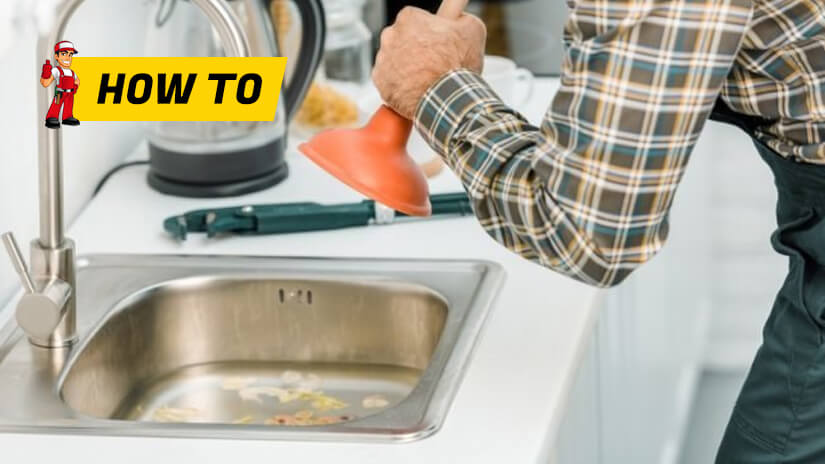Got a kitchen sink that’s draining slower than you’d like? You’re in luck; you might just be able to fix it yourself with some common tools and a bit of elbow grease.
Over time, bits of food, oil, and other debris can find their way down your kitchen sink, eventually causing serious blockages.
Grease-clogged pipes are caused by grease, oil, and fat, typical by-products of foods or cooking processes like meats, food scraps, dairy products, butter, coffee grounds, rice, eggshells, fat-based soaps, and detergents. Anything else that comes from food or is used for cooking can cause clogging.
Even when you’re diligent about tossing your leftovers in the bin, grease still sneaks into the pipes. It’s a pesky problem that can go unnoticed until it causes an overflow.
Grease by itself isn’t the bad guy. Over time, it builds up, lining your pipes and turning into stubborn clumps that hinder water flow.

This will result in a kitchen sink that drains very slowly. Unlike your compost bin, you may also encounter a nasty smell due to rotting food.
Spotting these signs? It’s time to clear your clogged kitchen sink, and fortunately, it’s usually not that hard to tackle.
Check You’ve Got the Tools.
Try this: pour a mix of baking soda and vinegar—white or apple cider—followed by boiling water down your drain. This fizzy combo helps loosen up any hardened grease and gunk clinging to your pipes.
If pouring your white vinegar mixture doesn’t work, you must have a few tools to clear the drain. Here are some which may help you:
- Plunger
- Plumber’s snake (you can rent or purchase this) or a DIY from a wire coat hanger
- Allen wrench
- Pipe wrench
- Clamps
- Pliers
Plunging the Drain
The go-to method for people would be plunging into the sink because many have done it before with a blocked toilet. However, there are other options, as described below.
Garbage Disposal
Often, the issue with a blocked kitchen sink is an obstruction in the garbage disposal. Check first to see if this is the case. If you turn on the disposal and it won’t go, this is a sure sign that it’s blocked.
In this case, unplug it and try to turn it using a hex or Allen key. Slot the wrench through the hole at the bottom, find the blades to attach the wrench, and turn it.

How to Plunge Your Drain
- If the disposer is not the issue, you can start plugging the drain in the sink. If you own a dishwasher, clamp the hose first. Then, run water into your sink until about 3 or 4 inches are in it. This will help the plunger to create a tight seal around the drain opening.
- Plunge forcefully for about 20 seconds. Then, roll the plunger around your sink in the water. This will hopefully push water down the pipe rather than air. Continue plunging.
- Try to make it pop on your final pull to remove the plunger. This creates increased pressure, which may dislodge the blockage. If the water is still not draining, you must repeat the process until you have no standing water, and it works.
Tip:
If you have just poured drain cleaner down your clogged drains, you should not plunge them. Doing so can cause the cleaner to splash back up at you, which is highly dangerous as most of these are made from chemicals.
Snaking Your Drain
If you plan to invest in a plumber’s snake, ensure you get a good one. You can usually find excellent but cheap options at hardware stores. When selecting one, you will see they come in different lengths, sizes and turning mechanisms. Generally, a 3/8 inches 30 feet snake will trick your kitchen drain.
How to Snake Your Drain
The process is relatively straightforward once you’ve got a snake that fits your drain. Undo the screw at the top of the snake and pull out 6 – 10 inches of the cable. Refasten the screw. Push the plumber’s snake into the drain with a spinning motion. Keep pushing until you feel a barrier – this is likely the blockage. Loosen the screw more and let out more cable and refasten. Then, keep pushing the snake in.
Next, you must put the tip into the stub-out and tighten the screw. Tighten the crank clockwise. Turn the snake whenever you feel a barrier, as this is how it forces through a clog. Once you think the tip has gone through any clogs, you may be ready to remove the plumber’s snake. Carefully pull it out while cleaning it, as it will be covered with muck and debris. Keep a bucket or bin nearby to throw any clogs the snake brings up. Repeat the above steps until you are satisfied that no more clogs lurk in the drain. Then, run warm water down the drain to clear out any dregs left behind and loosened up by the snake.
Cleaning The P-Trap
Sometimes, clogs are in the P-trap of your drain. This curved section is often where food scraps and dirt can’t escape. Instead, they sit there, building up a blockage that grows over time.
Many people don’t realise that used coffee grounds should not be poured down the sink. They do not dissolve and, along with food scraps, can cause large obstructions in the drain.
How to Clean the Trap
Please eliminate any water lingering in your sink by sponging it off and placing a bucket under the sink for any runoff. Undo the nut that holds the trap arm in place. You may need to use a good pair of non-slip pliers. Loosen the nut that sits between the P-trap and trap arm. Undo the nut at the bottom of the t. Clean out anything that may be sitting in the trap. Check the P-trap and arm for leaks and cracks that may cause drainage troubles. You will need to replace the part if you find leaks or cracks. After cleaning, put everything back and check whether the water drains quickly.
Need a Plumbing Service?
If you maintain your kitchen sink’s cleanliness and are mindful of improperly disposing of items and unintentionally dropping them, you can eliminate clogging your drains. Beware also of undetected leaks and problems you may not be able to see or notice immediately.
Changing a few habits, getting your hands dirty, and putting more time and attention into your home’s drains may save you a lot of money.
Here at Fixed Today Plumbing, we’re always available to provide the best possible solutions. Our professional plumbers are trained to deal with any situation. Whether you have clogged or broken pipes or the issue is something else, we can fix it. We can repair your drains or clear them for you. We can detect difficult blockages and leaks using the latest tools and equipment. Our plumbers carry CCTV cameras, jetting equipment, pipe-locating equipment, and electric eels. Not only that, but we also kill tree roots through root treatment. Tree roots invading your pipes can also be a big culprit in blocking your drainage system.
Call us now to discuss your plumbing concerns, and we can be right over to help you.














